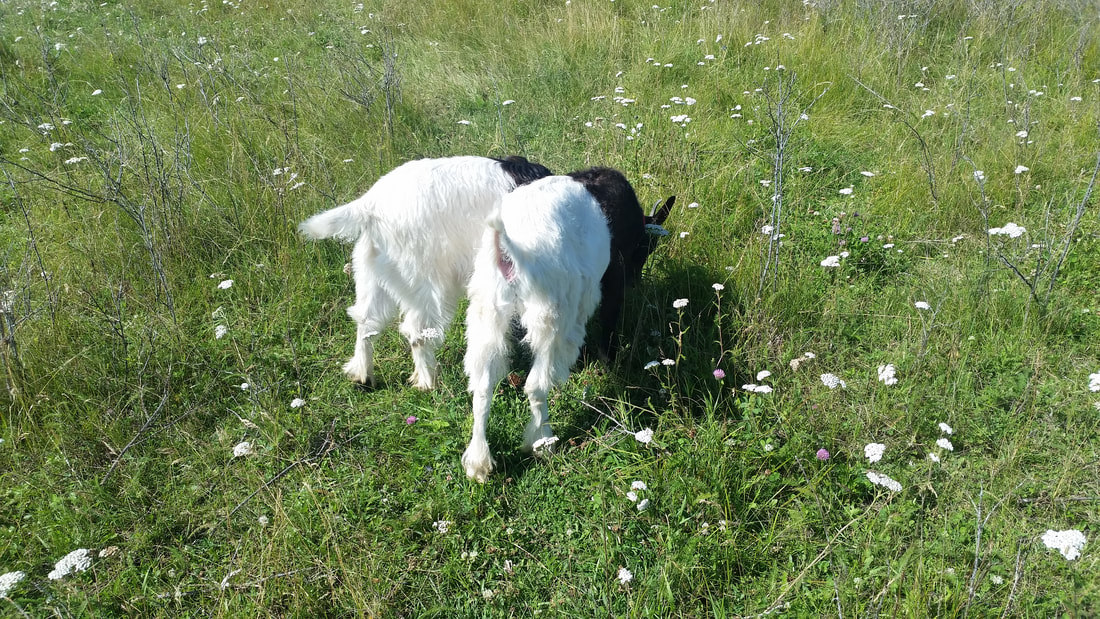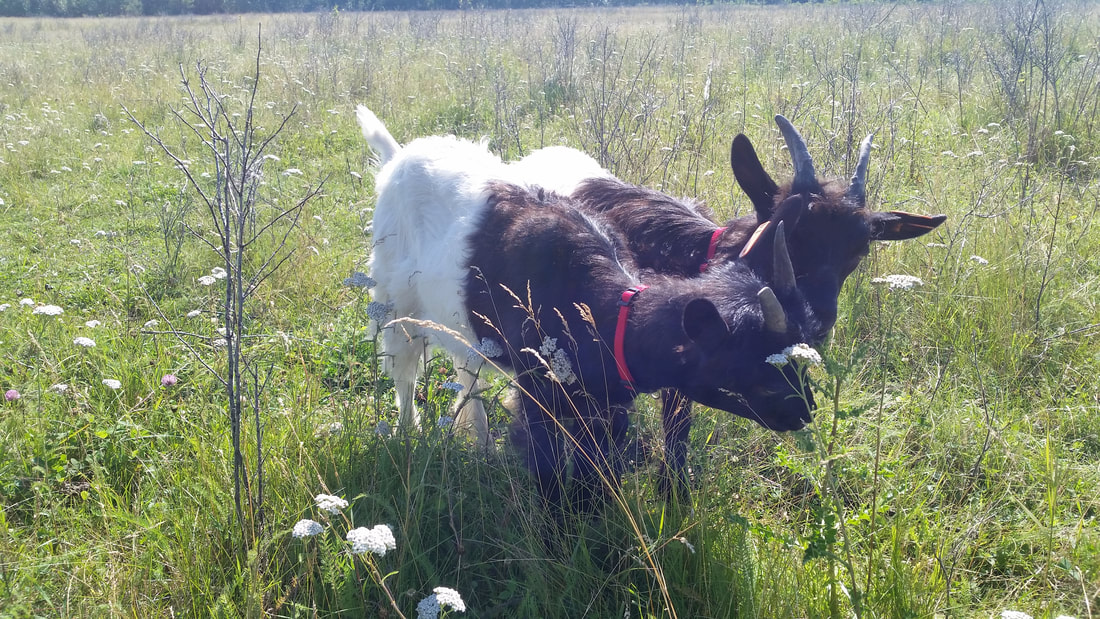The babies that are removed from their dams and are bottle fed, have no idea how to be goats. They are so dependent on their humans for food, that they do not learn to properly forage. Meals are delivered via bucket or bottle, and grain or other feed comes also from the human caretaker.
The babies do not have a good concept of where and what to eat. In my setup for summer, the goats and sheep are cohoused and share the pasture. While the sheep mainly prefer to stay on the open grass and find tasty morsels of clovers, blades of grass and various weeds, the goats head to the bush where they demolish with gusto the caraganas, raspberries, roses and any other delicious shrubs. They do also nibble on the tender grass in the bush.
The bottle babies will not follow the goat herd out to the pasture. They follow the human. Me. So I walk out to the pasture with them every morning and hope they will find something good and continue with the goat herd, but on some days, they simply stay by my side and even if I wait, the moment I turn to leave, they follow. How frustrating.
But the worst part is, without their dams teaching them what to eat, they eat the wrong things. Because the bottle babies return to the night pen, where there is grass and clover in abundance, and other weeds, they eat it. The other sheep and goats will not eat there. Their mothers have taught them that eating close to home is bad and it is. That is where the animals defecate and urinate and in the poop are worm eggs, which crawl to the tips of the grass and weeds and are waiting to be eaten so they can infest the goat or sheep. This then leads to worm overloads.
In my herd of goats and flock of sheep, I seldom have to deworm anything. That is because of several reasons. One, I have only kept naturally pest resistant animals. Those that constantly succumb to worms are sold. Few have died. No matter what I did for them, they simply could not recover well enough to thrive. But they were also the animals that ate close to home.
There is hay in the night pen because goats and sheep always eat. We tend to think they sleep from night to morning, but that is not the case. They often get up and eat a bit and then sleep again, so it is paramount to keep food for them or they too will eventually eat the grass and weeds in the night pen out of hunger. They know not to and won't if they have another food source. So, they always have hay year round. Ideally, the night pen should be a dry lot, that is a pen where no grass or weeds are found at all and the ground is covered with shavings, or straw or something instead. My night pen is in a small bush area, which provides security and shelter. The goats have a barn and the Guernsey cow has a lean to. The sheep stay outside by choice. But they do not eat the forage there.
Now, back to bottle babies. I recently added 3 goats to my farm, Swiss Blacknecks, a rare breed in Canada. They are beautiful dairy goats and I want to breed them and further their development in Canada. While I do like that the goats are tame and friendly, I greatly dislike that they are under foot constantly, that they are clueless when it comes to foraging, that they do not herd with the rest of the goats, that they are human dependent and that they are more work for me than they should be. The day before the Swiss Blacknecks arrived, a Nubian doeling joined the farm. She is not bottle raised, but was hand raised and what a difference. She is not dependent on my, though I can approach her and pet her or examine her without her panicking and running away. Hand raising animals with their mothers in place is by far the better way.
Emma, the Nubian, is friendly, easy going and gentle, but she follows the herd as she would have been taught by her dam. She knows not to eat the forage in the night pen, instinctively, because of her exposure to adult goats as a baby. I wish she would bond with the Swiss Blackneck girls as they are all new and arrived a day apart, but the Blacknecks are too human bound due to their removal from the herd and exposure just to humans.
I am planning to have milk goats in the next year. I have learned that there is a better way to raise the babies than to remove them. They need to stay with their mothers to learn how to be goats. My plan is to keep them apart at night after a couple of weeks, milk the moms in the morning and separate them again at night. This is for sure more work and at first more stressful for the babies and moms, but it is a win win situation. No bottle babies. Dam raised kids that know how to be goats. Milk for goat cheese for me and milk for the babies too. In conclusion, I just want to emphasize how keeping bottle babies away from the goat herd does a great disservice to a naturalized forage flock. If the goats are in a dairy situation, it likely does not matter much, but on a farm, complete with predators, dogs and dangers, being with the mother and the herd is necessary. At least I think so. Do you?



 RSS Feed
RSS Feed